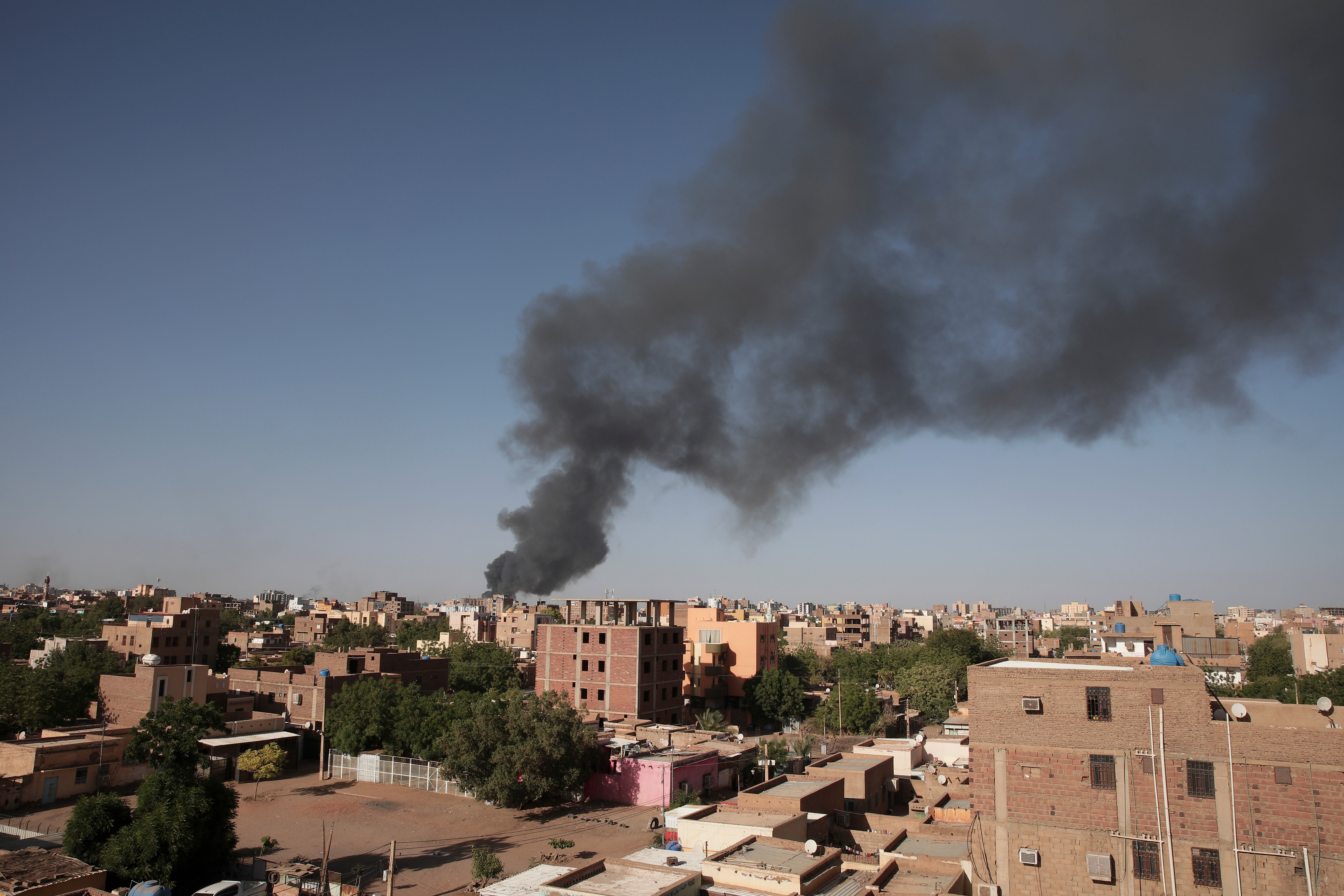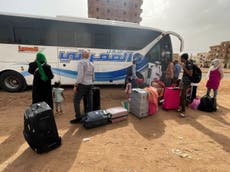Ex-Sudanese PM warns conflict risks becoming ‘nightmare for world’ as civilian death toll hits 411
Thousands of people have fled the country since the fighting began
Your support helps us to tell the story
From reproductive rights to climate change to Big Tech, The Independent is on the ground when the story is developing. Whether it's investigating the financials of Elon Musk's pro-Trump PAC or producing our latest documentary, 'The A Word', which shines a light on the American women fighting for reproductive rights, we know how important it is to parse out the facts from the messaging.
At such a critical moment in US history, we need reporters on the ground. Your donation allows us to keep sending journalists to speak to both sides of the story.
The Independent is trusted by Americans across the entire political spectrum. And unlike many other quality news outlets, we choose not to lock Americans out of our reporting and analysis with paywalls. We believe quality journalism should be available to everyone, paid for by those who can afford it.
Your support makes all the difference.Airstrikes rocked parts of Sudan’s capital Khartoum on Saturday despite the extended ceasefire by the country’s two warring factions, as the former Sudanese prime minister urged both sides to get together for peace talks.
Terrified residents in some areas of the city reported explosions nearby and fighters ransacking houses, although residents in other areas said shops were reopening as the scale of the fighting dwindled.
Clashes were continuing around the presidential palace as well as the state broadcaster’s HQ and a military base in Khartoum.
The continued fighting comes despite the army and the paramilitary Rapid Support Forces (RSF) having agreed to a renewed ceasefire from Friday until Sunday after heavy international pressure.
According to Sudan Doctors’ Syndicate, 411 civilians have died and another 2,023 have been injured since 15 April, when a long-simmering power struggle between the army and RSF boiled over into conflict.
The country’s former prime minister Abdalla Hamdok on Saturday urged for both sides to come together for peace talks to stop a full-blown civil war on the scale of the Libya and Syria conflicts.

He said in a press conference in the Kenyan capital Nairobi: “This is not a war between an army and a small rebellion. It is almost like two armies – well trained and well armed.
“God forbid if Sudan is to reach a proper civil war ... it is a huge country and very diverse ... it would be a nightmare for the world.”
Fighting broke out earlier this month after a disagreement between army leader Abdel Fattah al-Burhan and RSF chief Mohamed Hamdan Dagalo over how to transfer to a democracy after the fall of dictator Omar al-Bashir.
The military has appeared to have the upper hand in the fighting, with its monopoly on air power, but it has been impossible to confirm its claims of advances. The Sudanese army has been blamed by the RSF for airstrikes on residential blocks being hit.
"Soon, the Sudanese state with its well-grounded institutions will rise as victorious, and attempts to hijack our country will be aborted forever," the Sudanese military said in a statement on Saturday.
International diplomats have been unable to travel to Sudan to mediate. However, a UN official said on Saturday that both sides are more open to negotiations and have accepted the conflict cannot continue.
Volker Perthes, UN special representative in Sudan, said the sides had nominated representatives for talks which had been suggested for Jeddah, Saudi Arabia, or Juba in South Sudan, although he said there was a question over whether they could get there to “actually sit together”. He said no timeline had been set for talks.
For now, Khartoum, a city of 5 million, has been transformed into a front line, while more than 50,000 refugees – mostly women and children – have crossed over to Chad, Egypt, South Sudan and the Central African Republic, the UN said.
Hatim el-Madani, a former journalist, said that paramilitary fighters were stopping refugees at roadblocks outside Khartoum, demanding they hand over their phones and valuables.
“There’s an outlaw, bandit-like nature to the RSF,” he said, “They don’t have a supply line in place. That could get worse in the coming days.”
The fighting has left areas of Khartoum without electricity and running water. There have also been reports of UN offices in Darfur being looted – which a peace coordinator called “unacceptable” and “prohibited under international law”.
Meanwhile, the UK Foreign Office organised the final flight for British nationals out from Wadi Saeedna airfield near Khartoum at 1200 local time [1000 GMT] and said 1,888 people have now been rescued on 21 flights.
Having previously prohibited non-passport holders from boarding the last flight, the government moved to include NHS doctors without UK passports. The change of policy was announced just hours before take-off.
Having closed its base in Khartoum, the British government has now set up a diplomatic presence in Port Sudan on the east coast and said British nationals can present themselves.
“If you are a British national in Port Sudan who needs help to leave Sudan, visit our team who will be able to signpost you to options for departure,” a statement reads on the UK government website.
The east coast is still being used as a transit point with large ships continuing to carry out thousands of multinationals into Saudi Arabia.
Hundreds of Americans fleeing the conflict reached the port on Saturday in the first US-run evacuation, under the escort of armed drones.
American unmanned aircraft, which have been keeping an eye on overland evacuation routes for days, provided armed guard for a bus convoy carrying 200 to 300 Americans over 800km (500 miles) to Port Sudan, a place of relative safety, US officials said.
The US, which had none of its officials on the ground for the evacuation, has been criticised by families of trapped Americans in Sudan for initially ruling out any American-run evacuation for those among an estimated 16,000 Americans in Sudan who wish to leave.
US special operations troops briefly flew to the capital on 22 April to airlift out American staff at the embassy and other American government personnel.
More than a dozen other nations have already been carrying out evacuations for their citizens, using a mix of military planes, navy vessels and ground personnel.




Join our commenting forum
Join thought-provoking conversations, follow other Independent readers and see their replies
Comments